Anyone with much experience of life will be aware that, as a general rule, when life improves for one person, it often improves for another.
This happens in an economy all the time.
It is well known that one restaurant in one city block might be popular enough to bring in a certain number of customers. But a group of competing restaurants in the same place are much more likely to bring in a much bigger number. In other words, you are more likely to be successful through sharing space with other restaurants.
Growing an economy might well rest on this. One cannot just make a product and sell it on your own. You need to be part of a chain that enables your market and ensures you have both suppliers to help you make your product, and customers to buy it.
People who are thinking over the longer term will often make decisions that will cost them in the short run, because they expect to gain in the longer run.
Last week, Moneyweb reported that some suppliers to Pick n Pay were actually giving it goods at lower than usual prices. While this costs them in the short run, they don’t want a situation where Checkers becomes so dominant they only have one person to sell to.
This means that they are helping someone to regain market share.
In the case of South Africa, with its incredibly diverse constituencies, and defined by its inequality, the idea of people helping one another might well be more important than in many other places.
Winners and losers
The nature of our economy requires everyone to be working in the same direction. Instead, what we have is people simply fighting really hard not to be the losers, and others not the winners. Currently, 50 proposals to change the Labour Relations Act are going through Nedlac.
While labour analyst Andrew Levy says it’s not clear if they really change the balance between workers and managers, several groups and unions have already held a protest against the proposals. They believe that their members might soon lose out, and managers might win.
This kind of situation happens all the time in our society. In our politics, the coalition sometimes appears to be reduced to fights between the ANC and the DA that are literally about ensuring one wins and the other loses.
Because this is all happening in public, and they are representing constituencies, it can give the impression that those constituencies are really fighting to ensure they are not seen to lose. This transactional approach, and the damage it can cause, is wonderfully, and horrifically, illustrated by the Trump administration’s approach to trade.
One of the most important dynamics of the past 30 years has been the rise of China as a manufacturer of trade goods. It has made these goods at a cheaper price than many other places, and sold them.
This has exported deflation around the world – the price of a cheap bicycle has declined dramatically in real terms since the 1980s. This is largely because companies in different countries have traded with each other. And both parties have become very rich doing so.
Trump appears to believe that if one country is getting rich, the other must be losing out. The overwhelming evidence is that this is not the case. Instead, both parties win through these transactions. In some ways, such is the impact of the US, that this example might well be having an impact on our politics.
At the same time, another important aspect of how life really works is being lost. In many cases, there is no clear “winner” and clear “loser”. Often it is entirely grey, with very little difference in shade.
The NHI stand-off
In our politics now, it seems that everything must become a life and death situation, that there will be armageddon if someone does not get what they want. Given our inequality, this can sometimes appear as if it is a life-and-death struggle between classes.
The NHI might be a useful example: those who support it say the rich are trying to condemn the poor to death, those who oppose it say the rich will lose everything they have.
Instead, this is something that should really be negotiated between representatives of constituencies. And there should be a solution that everyone can live with.
There are many reasons why we are in this situation. Our racialised inequality must be an important reason. Those who are poor have everything to gain and nothing to lose, while those who are rich have everything to lose and nothing to gain.
But this may also be the result of deliberate political strategy. Just as politicians have created abortion as a political issue in the US, by forcing people to take a position, so our leaders often do the same.
Both the ANC and the DA benefit from continuing the fight around the NHI. They both get to demonstrate to their constituencies that they are fighting for them.
And because the struggle for voters is now so difficult and so intense, the stakes rise each time, and so it is more likely that politicians will behave in this way. All of this feeds an artificial intensity in our politics.
And it is likely to become more and more damaging the longer this continues. DM





 Illustration image: Sources | Democratic Alliance leader John Steenhuisen. (Photo: Gallo Images / Die Burger / Lulama Zenzile) | President Cyril Ramaphosa. (Photo: Gallo Images / Beeld / Deaan Vivier) | South African flag. (Photo: EPA-EFE / Nic Bothma) | US President Donald Trump. (Photo: EPA-EFE / Shawn Thew / Pool)
Illustration image: Sources | Democratic Alliance leader John Steenhuisen. (Photo: Gallo Images / Die Burger / Lulama Zenzile) | President Cyril Ramaphosa. (Photo: Gallo Images / Beeld / Deaan Vivier) | South African flag. (Photo: EPA-EFE / Nic Bothma) | US President Donald Trump. (Photo: EPA-EFE / Shawn Thew / Pool)